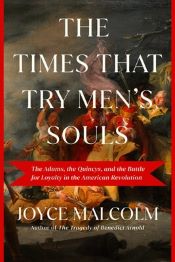As Malcolm expressed in her book, the American Revolution was much more crippling to our country than the Civil War. Many of the Loyalists who fled the country and thought they could come back after the war found that they were banished and were punished, even executed, if they tried to return. She said, “This one, in some ways, it’s harder because the American Civil War was mostly divided along geographical lines, but here, you have within families. You know, members of the Continental Congress who had families who were exiled and were still wanting to execute Loyalists at home. It was much more mixed and very hard to be neutral because you had to take an oath to support the opposition to Britain… it was difficult whatever you did, whether you left, whether you stayed, or whether you tried not to take any side whatsoever, but it really was a civil war and I think they saw it that way.”

One of the things that surprised me was the sheer number of families that had split some positions ideologically.”


These are the times that try men’s souls. The summer soldier and the sunshine patriot will, in this crisis, shrink from the service of their country; but he that stands by it now, deserves the love and thanks of man and woman.”

Podcast: Play in new window | Download
Subscribe: RSS

Want to join the discussion?
Feel free to contribute!